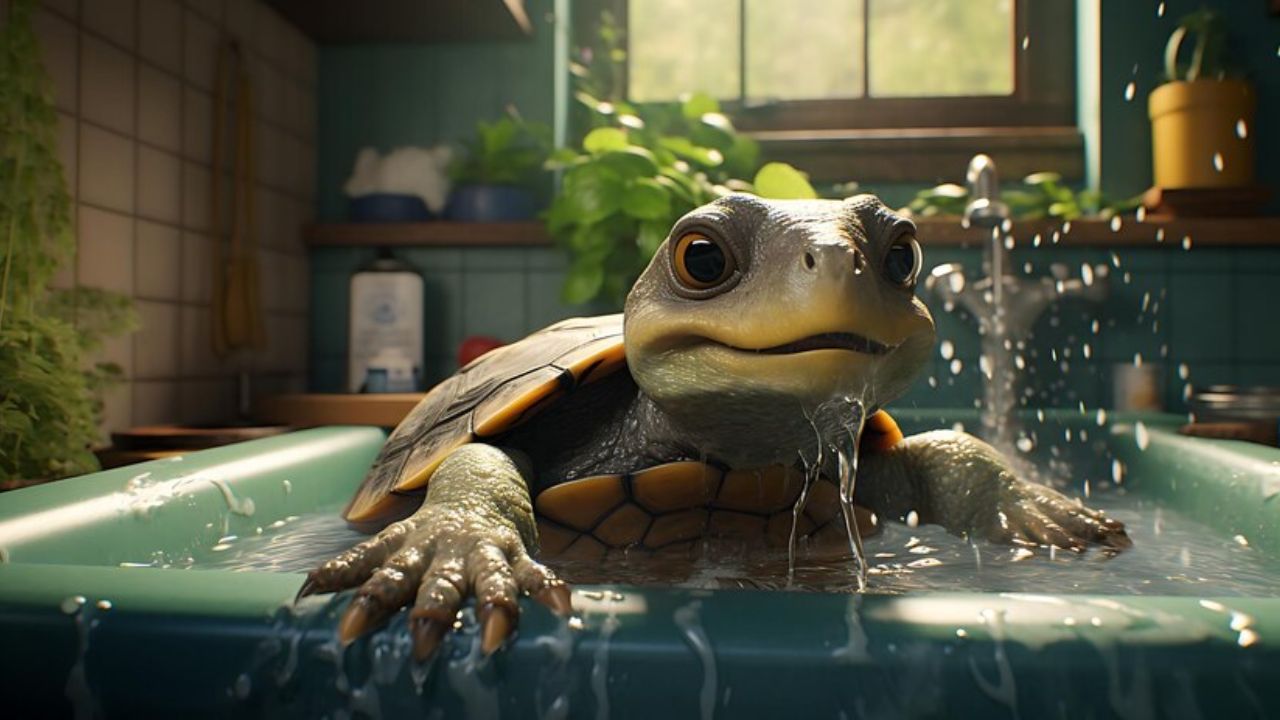Pet Turtle Diarrhea: Causes and treatment
Diarrhea of a CGI Turtle Trivia are fascinating creatures, but their health requires careful attention, especially when it comes to digestion. Diarrhea of a CGI Turtle Trivia is a common concern for owners, as it can indicate serious underlying health issues. While occasional loose stools might not be alarming, persistent diarrhea should never be ignored. In this guide, we’ll explore the causes, symptoms, and treatments for pet turtle diarrhea to help you ensure your turtle’s well-being.
Understanding Pet Turtle Digestion
Unlike mammals, turtles have a slow digestive system that relies on the right balance of temperature, hydration, and diet. Their digestion depends on external warmth, meaning an improperly heated tank can disrupt their gut function. Additionally, different species have different dietary needs—herbivorous, omnivorous, and carnivorous turtles require specific nutrients to maintain digestive health.
What Is Pet Turtle Diarrhea?
Diarrhea in turtles refers to abnormally loose, watery, or frequent stool. Healthy turtle feces should be firm, brown or greenish, and well-formed. If you notice excessive mucus, undigested food, or a foul odor, it might be a sign of digestive distress.
Causes of Pet Turtle Diarrhea
Several factors can contribute to Diarrhea of a CGI Turtle Trivia. Some of the most common causes include:
-
Dietary imbalances
-
Bacterial or viral infections
-
Parasitic infestations
-
Incorrect habitat conditions
-
Dehydration
-
Toxins or poisons
-
Metabolic diseases
Understanding the root cause is crucial for effective treatment.
Dietary Issues Leading to Diarrhea
A poor diet is one of the leading causes of digestive issues in turtles. Common dietary mistakes include:
-
Overfeeding: Excessive food intake can overwhelm the digestive system.
-
Improper diet: Feeding turtles the wrong food, such as too much fruit, can disrupt digestion.
-
Spoiled food: Consuming rotten or contaminated food leads to bacterial infections.
-
Lack of fiber: A diet low in fiber may cause loose stools.
Bacterial and Viral Infections
Bacterial infections, such as Salmonella, can lead to severe diarrhea in turtles. Symptoms include lethargy, loss of appetite, and weight loss. Some viral infections also affect digestion, though they are less common.
Parasitic Infections and Their Role
Parasites such as roundworms, protozoa, and flagellates can cause persistent diarrhea. Turtles may contract parasites from contaminated water, food, or contact with infected reptiles.
The Role of Temperature and Habitat Conditions
Turtles require specific environmental conditions for proper digestion. If their tank is too cold, their metabolism slows down, leading to indigestion and diarrhea. A basking area of 85-90°F (29-32°C) and a water temperature of 75-80°F (24-27°C) is essential.
Dehydration and Its Connection to Diarrhea
Dehydration weakens the digestive tract, making turtles more prone to diarrhea. Ensure your turtle has clean, fresh water available at all times.
Toxins and Poisoning as a Cause
Some household chemicals, fertilizers, and plants are toxic to turtles. Avoid exposure to harmful substances, and ensure their food and water sources are safe.
Metabolic Disorders and Digestive Problems
Turtles with vitamin A deficiency, kidney disease, or liver dysfunction may experience chronic diarrhea. A balanced diet with appropriate supplementation can help prevent these issues.
How to Diagnose Pet Turtle Diarrhea
If diarrhea persists for more than 48 hours, it’s time to consult a veterinarian. A vet may perform:
-
Fecal examination for parasites
-
Bacterial cultures
-
Blood tests for metabolic disorders
Home Treatment Options for Mild Cases
For mild diarrhea, try these home remedies:
-
Increase hydration: Soak your turtle in clean, lukewarm water for 20 minutes.
-
Adjust diet: Reduce fruit intake and focus on leafy greens and proteins.
-
Probiotics: Safe reptile probiotics can help restore gut bacteria.
Veterinary Treatments for Severe Cases
For severe diarrhea, a vet may recommend:
-
Antibiotics for bacterial infections
-
Deworming medication for parasites
-
Fluids via injection to prevent dehydration
The Role of Probiotics in Turtle Digestion
Probiotics support healthy digestion by maintaining gut flora. Safe options include products designed for reptiles or natural sources like plain yogurt (in small amounts).
Adjusting Diet for a Healthier Digestive System
To prevent future digestive issues:
-
Feed species-appropriate foods.
-
Provide a mix of proteins, leafy greens, and calcium sources.
-
Avoid excessive fruit and processed foods.
Preventing Future Cases of Diarrhea
-
Maintain proper temperature and humidity.
-
Keep the tank clean and free of contaminants.
-
Quarantine new turtles before introducing them to others.
Common Myths About Turtle Diarrhea
-
Cold water causes diarrhea – Incorrect. However, low temperatures slow digestion.
-
Turtles will recover on their own – Sometimes, but severe cases need treatment.
-
Diarrhea isn’t contagious – Some bacterial and parasitic infections can spread between turtles.
Conclusion
Pet turtle diarrhea is a manageable condition if addressed early. A proper diet, clean habitat, and timely veterinary care can prevent serious complications. By understanding the causes and treatments, you can keep your pet turtle happy and healthy.
FAQs
How can I tell if my turtle has diarrhea?
Observe for watery, foul-smelling stool and other signs like lethargy.
Can stress cause diarrhea in turtles?
Yes, changes in environment or handling can upset digestion.
Should I stop feeding my turtle if it has diarrhea?
No, but adjust the diet to simpler, easy-to-digest foods.
Can I give human probiotics to my turtle?
Only use probiotics designed for reptiles.







